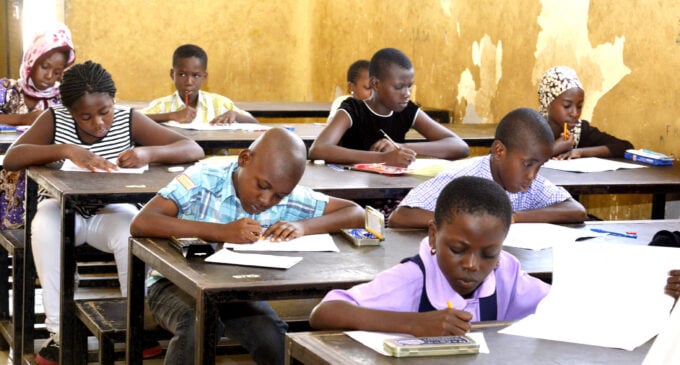Educating the next generation in a globalised world

Change is often touted as a certainty and with the advent of COVID-19, it is no news that almost every aspect of our lives will experience a change that is significantly different in one way or the other, from what and how we lived before the outbreak. First, almost if not all schools across the globe have temporarily closed down in an attempt to suppress the virus spread.
UNESCO Institute for Statistical data reports that over 39 million learners in Nigeria have been affected by this shutdown and this does not include the 13.2million out of school children. From the foundation level which is the basic level, to the Tertiary level of our educational system, pupils and students can no longer learn in the traditional school setting where they all physically took lessons from their teachers usually from the confines of a classroom with blackboard or whiteboard. It is obvious, things will never be the same again. Sadly, the schools and students have received little or nothing in terms of educational palliatives, or just any form of national or state level intervention.
Today, in some homes, people have adopted alternative means of keeping up with learning. “Home Schooling” has become the order of the day. Most parents have taken up the challenge of bridging the learning gaps by teaching their children at home using resources obtained from random sources or through a tutor. Because of the uncertainty of an immediate end to the virus attack against the need to remain in business, most educators now opt to deliver education through distant learning approaches. This varies from high end private schools , low investment private schools to public schools. In fact, only last month, Lagos State Commissioner of Education called for private schools to adopt remote (digital) learning during the period. With digital learning as the new norm, teachers send lessons and assignments to students through their own devices or their parents’ or guardians’ emails, whatsApp, etc. This may appear laudable but like many other crises that have rocked our educational system prior to this time, it has only brought to light the shortcomings of this critical sector, that defines our future.
Digital learning entails students having access to a minimum of a digital device such as a smart phone, tablet, computer etc, substantial power supply and data service, in enabling environments. Using case studies of the public and low-cost private schools, that is private schools for the poor, when you consider the number of families with children/wards in these schools that can really afford or have access to these basics, one can only imagine the challenges these students will face in the wake of the new education styles. In most public primary schools, the typical student is one who most likely have studied under a tree or in a classroom of 60 pupils meant for 25 persons, and in a most depilated condition. If you randomly sample 10 students from different public schools, you will find that at least 5 students have never operated a computer before, have been taught different subjects by one teacher, do not have access to a smart phone device , nor have parents or guardians that can afford to buy a data bundle sufficient enough to download a short video exercise sent by teachers. I have even heard that parents who are home-schooling their children have tripled the frequency at which they buy data bundles since data runs out as the children use the internet to study. Can the parent living down in the village meet up with this expectation? Unfortunately there is no national effort to bridge this gap as obtainable in some countries. Ukraine worked with UNESCO to develop an online curriculum and learning passport, Rwanda is working with Rwanda Broadcasting Agency to run a national programme “learning on radio” and North Macedonia started “ TV classroom” .
On the part of the schools, most of them can hardly meet up with their financial obligations, let alone have access to computers. They cannot even finance remote learning, let alone train the teachers to adopt digital learning approaches. Adopting digital learning comes with significant investment in technology and updating skills of instructors. Some schools even owe teachers, killing every motivation they (the teachers) may have to embrace remote learning. As if that is not enough, like the students and even teachers, some parents/guardians do not know or understand how to use digital solutions like Whatsapp and Zoom for learning. I am quite certain that most schools never deemed it necessary to teach their students how to use simple applications on smart phones for studying. But can you give what you do not have?
There is a concern that if we cannot deal with the most basic technology requirements for learning today, how do we prepare our children for technologies that have not been invented, jobs that have not been created and challenges which we have not envisaged. According to a Dell Technologies report, 85% of the jobs in 2030 and beyond the current generation of students will enter into have not been invented yet. World Economic Forum report, says 65% of primary-school children today will be working in job types that do not exist yet. Poor investment in and prioritization of education will certainly widen inequalities and make it difficult for our children to compete globally.
Yet, with rapid globalization, the products of our educational system are expected to compete with their counterparts elsewhere. This will be an unfair struggle for any student in this situation and this is neither a factor of his genetic make-up nor because he is unintelligent. It is simply a failure of the system. A system that has over the years neglected or underinvested in a strategic sector that shapes the kind of future we want . But then, is the world ready to excuse our consistent disregard for educational upgrade and wait for us? Certainly no, or not for long. The world is much more globalized today and there will be no local standards but only global standards. To say the least, the way we educate the next generation, the knowledge and skill sets, as well as the values, need a complete overhaul to remain competitive.
Adoption of technology to advance learning is not the only challenge we face in public and private schools or in our educational system. Our entire policy framework needs to be revisited. Teacher training especially in a coming era that will require new competencies to adapt to a rapidly changing world should be given serious attention,there is no denying the fact that the quality of teachers in public schools and in most private schools leaves much to be desired. Content development and instructional design need to be tweaked. Critical thinking, creative thinking, and other metacognitive,social and emotional skills are not emphasized in our student training, making it a herculean task for them to deal with new challenges. Education is more than passing exams and earning certificates .
One area that we cannot shy away from is the impact of underinvestment in the education sector over the years . From a federal government perspective we have never come near the 15 percent recommendation of UNESCO . For example in the 2020 budget, a provision of 6.7 percent was made for education sector , 2019,7.05%, 2018,7.04% and 2017,7.40%. There is the argument that there is substantial private sector Investment in education in the form of private schools across all levels , but we need to examine the quality of and access to the schools . When these budgetary provisions arejuxtaposed against increases in student numbers and number of educational institutions it pales into insignificance. It takes us to the fact that if we want our children and wards to fit into a new world order where knowledge , skills , innovation , values,and attitudes will define our existence and competitiveness all of us must take responsibility.
It is not enough to dwell on the soar aspects of this quagmire without lending a hand to plausible solutions. Education as we know, instils hope for a brighter future and should never be treated as secondary. And the Government is really not the only actor that can revamp the rots in the educational system going forward. Private entities can play focal roles during these perilous times. Amongst other solutions, a little bit of our philanthropy will definitely come in handy. For example,to help in adapting technology to drive learning in an era like this, knowing the necessary demand for data to receive learning materials on smartphone devices, it will not be out of place to see partnerships with internet service providers to give free data to schools and their students, perhaps to their parents/guardians, being that they are the custodians of the devices. Another can opt to sponsor printed packets of learning materials to students around the country.
This is a wake-up call for every stakeholder including the government to pay special attention to this ailing sector with an all-encompassing approach that accommodates everyone irrespective of their background, status, or location.. In my optimism, I am resolute that beyond these deep challenges there is a bounty of opportunities for transformation. It behoves us to identify these opportunities and exploit them for the overall betterment of our students.
Views expressed by contributors are strictly personal and not of TheCable.













There are no comments at the moment, do you want to add one?
Write a comment